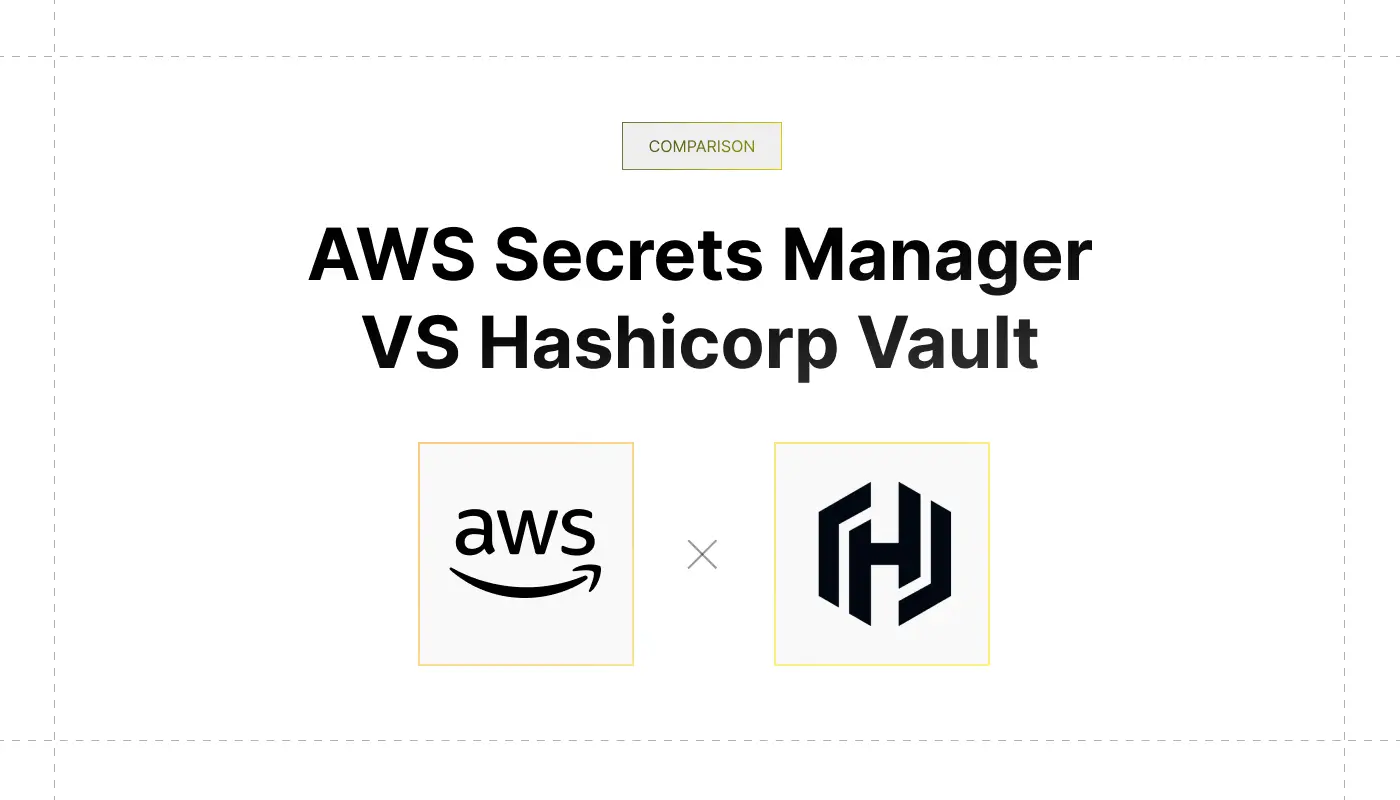
With companies like Mercedes Benz, Astrazeneca, and Samsung undergoing major credential leaks, secret management is a key concern for the majority of global enterprises.
Two prominent solutions in the realm of secrets management are AWS Secrets Manager and HashiCorp Vault. Both platforms offer robust solutions for securing, managing, and monitoring access to secrets across various environments. However, their approaches, features, and suitability for different organizational needs can vary. This blog post aims to dissect and compare these two solutions to aid in making an informed decision.
In addition, the blog compares Secrets Manager and Vault to Infisical – the #1 open source secrets management platform for developers.
Overview
AWS Secrets Manager
AWS Secrets Manager is an AWS service designed to handle the secure storage, rotation, and retrieval of secrets like database credentials and API keys. It encrypts secrets using AWS Key Management Service (KMS) and allows users to define access permissions with AWS Identity and Access Management (IAM). The service supports automatic rotation of secrets to enhance security and offers multi-region replication for high availability.
HashiCorp Vault
HashiCorp Vault, on the other hand, is a source-available (not open-source) tool for secrets management, encryption as a service, and privileged access management. It's designed to handle multiple backends, provides secure secret storage, and tightly controls access to secrets in dynamic, multi-cloud or on-premises environments.
Key Features Comparison
1. Secrets Storage and Management:
- AWS Secrets Manager: Provides a managed service for storing, managing, and retrieving secrets. It automates the rotation of secrets and integrates tightly with other AWS services, making it easier to use within the AWS ecosystem.
- HashiCorp Vault: Provides a centralized place to store and access secrets. It supports various storage backends and offers dynamic secrets, generating credentials on-the-fly which expire after a set time.
2. Access Control:
- AWS Secrets Manager: Uses AWS IAM (Identity and Access Management) for access control, allowing fine-grained permissions for secret access, rotation, and management. This integrates well with AWS's security model but is specific to the AWS environment. In addition, user have reported challenges or issues that can arise with Secret Manager's access control mechanisms, primarily due to configuration and operational complexities at scale.
- HashiCorp Vault: Vault’s access control model is significantly more powerful but requires careful planning and management to avoid potential issues. It features a flexible policies system and supports multiple authentication methods. In addition, it offers identity-based access, enabling policies to be defined based on individual client identities.
3. Integrations and Ecosystem:
- AWS Secrets Manager: Naturally integrates well with AWS services, such as RDS for database credentials and Lambda for serverless applications. Its primary focus is the AWS ecosystem, which can be a limitation if you are operating in a multi-cloud environment or using any non-AWS CI/CD, deployment, or infrastructure tools. This may imply that your organizations needs to use other (often open source) tools on top of AWS Secrets Manager. HashiCorp Vault: Provides a rich set of APIs and a vast ecosystem of integrations, allowing it to fit into any part of the application lifecycle. Certain integrations are community-developed and not maintained by HashiCorp – making their quality less predictable.
4. Scalability and Performance:
- AWS Secrets Manager: Designed to scale automatically with the demand of AWS services. Being a managed service, AWS handles the scalability and performance, which is sufficient for most use cases but can incur higher costs at scale.
- HashiCorp Vault: Also scales well and is designed to handle high throughput, with support for replication and performance standbys to handle read-heavy workloads. It is worth noting that the replication architecture may be tedious to set up and comes with high maintenance overhead and occasional inconsistencies.
5. Audit and Compliance:
- AWS Secrets Manager: Integrates with AWS CloudTrail to provide auditing capabilities, tracking every call to the Secrets Manager API by users, roles, services, and from within other AWS resources.
- HashiCorp Vault: Offers extensive logging and audit mechanisms, ensuring that every interaction with secrets is tracked and available for audit purposes.
6. User Experience and Ease of Use:
- AWS Secrets Manager: Offers a straightforward user experience, especially for those already familiar with AWS. Its integration into the AWS console and the ability to manage secrets through AWS CLI and SDKs make it accessible. The UI can be fairly complex in the beginning and is not designed to be the primary control panel.
- HashiCorp Vault: The main problem with Vault still remains the difficulty of its implementation in the open source version, which is not significanly simpler for its costly Vault Enterprise edition. Vault is mostly operatable through its API with its UI being largely limited in functionality.
7. Open Source Licensing and Self-hostability:
- AWS Secrets Manager: It is a proprietary, managed service offered by AWS. There is no option for open-source licensing or self-hosting, as it is built to run within the AWS cloud infrastructure.
- HashiCorp Vault: Previously offered an open-source version under the Mozilla Public License 2.0. However, HashiCorp recently changed the license for future releases of its products, including Vault, to the Business Source License (BSL) v1.1. This license is not open source but rather source-available and allows for non-commercial use and commercial use under specific conditions, but restricts the use in competitive offerings. The change aims to give HashiCorp more control over the commercialization of its products. That being said, it is possible to self-host Vault on your own infrastructure – whether it is one of the public cloud providers or on-premises.
Another alternative: Infisical
Both Vault and AWS solve many problems of secret management, but introduce another important one – they can be extremely difficult to understand, implement, and maintain. Organizations can purchase the most secure tools, but engineers will find ways around those tools if they are not straightforward to use. As a result, organizations will not achieve the goal of enhancing security posture and saving developer hours. To solve this, organizations should consider taking a look at Infisical – the open source secret management platform for developers. Here are some of its defining characteristics:
- Open source under the MIT license;
- Various hosting options: Cloud or On-prem;
- Great developer experience with the focus on the ease of integration without sacrificing any security;
- Industry-tested by Fortune 500 corporations and international governments;
- Tight Access Controls, Permissioning Workflows, and Comprehensive Audit Logging;
- Integrations with leading Developer, CICD, and Infrastructure tools;
- Support for Secret Rotation and Dynamic Secrets;
If any of this sounds interesting, you can talk to our team to learn more.

Conclusion
Both AWS Secrets Manager and HashiCorp Vault offer good solutions for managing secrets and sensitive data for certain use cases. Even though they have their own challenges, the choice between the two often boils down to specific organizational needs, infrastructure, and personal preference.
-
AWS Secrets Manager is a great option if you are heavily invested in the AWS ecosystem and need a managed service for secrets management. It is likely a better fit for younger companies, and you may run into certain challanges depending on how complex your infrastructure is.
-
On the other hand, if you're looking for a highly-customizable solution that integrates into a multi-cloud environment even if it comes with a certain maintenance overhead, HashiCorp Vault could be the way to go.
-
Finally, in case your organization is looking for a developer-friendly solution with low maintenance overhead that can be integrated seamlessly across all of your technology stack and systems – Infisical may be the right choice for you.
In the end, a thorough evaluation aligned with organizational security policies, compliance requirements, and infrastructure needs will guide you to the right choice. Both platforms, together with Infisical, have their strengths and can significantly bolster your secrets management practices and organization-wide security posture.

